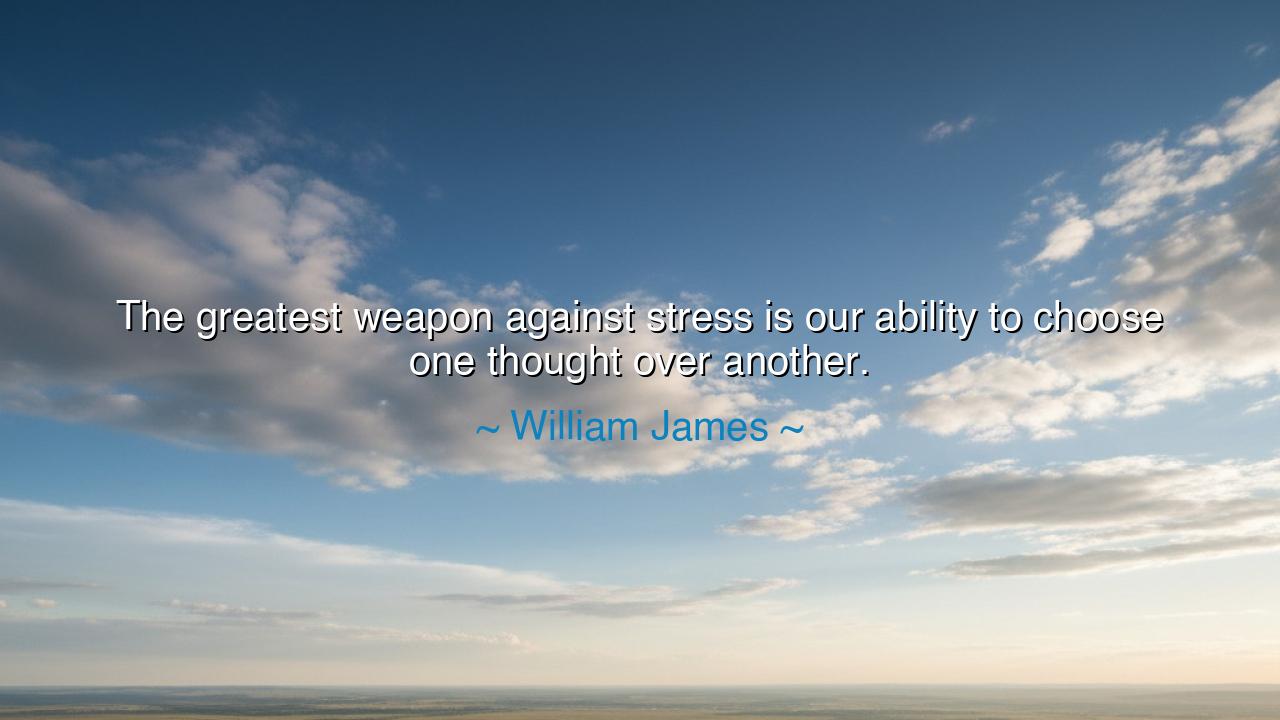
The greatest weapon against stress is our ability to choose one






“The greatest weapon against stress is our ability to choose one thought over another.” — William James.
Thus spoke William James, the father of modern psychology and philosopher of the human spirit, who peered into the mind as an explorer might gaze into the ocean — seeing not chaos, but the vast possibility of choice. In this immortal truth, he reminds us that though we cannot always rule the world around us, we may yet rule the kingdom within. For stress, that invisible tyrant, gains its power not from circumstance, but from our surrender — from the thoughts we allow to reign over our hearts. But within us lies a hidden power, simple yet divine: the power to choose. To turn our gaze from fear to faith, from despair to gratitude, from chaos to calm, is to wield the mind as a shield and the soul as a sword.
The origin of this wisdom comes from James’s lifelong study of the mind’s potential. Living in an age of scientific discovery and spiritual searching, he sought to unite the two — to show that the mind is not a passive victim of circumstance but an active creator of experience. He observed that the greatest difference between the weak and the strong, the broken and the serene, lies not in what happens to them, but in how they interpret what happens. Thus, he declared that the mind’s power of choice is the greatest weapon against suffering — for though life may press upon us with uncertainty and pain, we still possess the freedom to decide what meaning we shall give it.
To choose one thought over another is to reclaim dominion over one’s own being. The ancients knew this long before the age of science. The Stoic philosophers — Epictetus, Marcus Aurelius, Seneca — taught that no man is free who is not master of his thoughts. They too saw that the battle of life is not fought in the marketplace or the field, but in the mind’s quiet chambers. “You have power over your mind,” wrote Marcus Aurelius, “not outside events. Realize this, and you will find strength.” William James, centuries later, echoed that same truth in modern language, bridging ancient philosophy and modern psychology into one enduring law of wisdom: that the mind is both our battlefield and our victory.
Consider the story of Viktor Frankl, a man who lived through the horrors of the Nazi concentration camps. Surrounded by death, stripped of freedom, and starved of hope, he found that everything could be taken from him — except the last of human freedoms: the ability to choose one’s attitude in any given set of circumstances. He watched as some men withered in despair while others, though suffering equally, kept their dignity through compassion and meaning. Frankl survived not because he was spared pain, but because he chose to think differently. His spirit could not be broken because his mind remained free. In his suffering, he proved James’s teaching: the greatest weapon against stress is not control over life, but control over thought.
To master one’s thoughts, however, is no small task. The mind, left untamed, races like a wild horse — it drags us through fears of tomorrow and regrets of yesterday. Yet through practice and awareness, the mind can be trained to serve rather than enslave. The art of mindfulness, born in the East and rediscovered in the West, teaches precisely this: to observe thought without becoming it, to choose peace over panic, truth over illusion. When we notice that our thoughts shape our emotions, and our emotions shape our world, we begin to see how immense our power truly is. Every thought is a seed, and from it grows either a garden of serenity or a wilderness of suffering.
Thus, William James’s wisdom is not mere philosophy — it is a discipline of the soul. Each day, life will place before you a multitude of thoughts: fear and faith, anger and forgiveness, despair and gratitude. The mind will offer you many voices, some dark, some luminous. Your task is to choose. To pause. To say, “This thought shall serve my peace; that one I release.” In doing so, you do not deny hardship, but you deny hardship the right to rule you. You become, as James himself believed, the architect of your experience, the author of your emotional destiny.
So let this truth be passed down as sacred teaching: Guard your thoughts as warriors guard their swords. When stress arises, do not seek first to change the world, but to choose the thought that changes your world. Train your mind as you would train a muscle; let gratitude replace worry, purpose replace fear, and love replace bitterness. For the one who can choose his thoughts can never be truly enslaved — he walks free even amid the storms of life.
And remember always the wisdom of William James: “The greatest weapon against stress is our ability to choose one thought over another.” This is not the promise of a painless life, but the revelation of unbreakable strength — the kind that no circumstance can conquer. For the mind, when guided by choice and truth, becomes the calm eye within every storm, the eternal flame that no wind of the world can ever extinguish.






AAdministratorAdministrator
Welcome, honored guests. Please leave a comment, we will respond soon